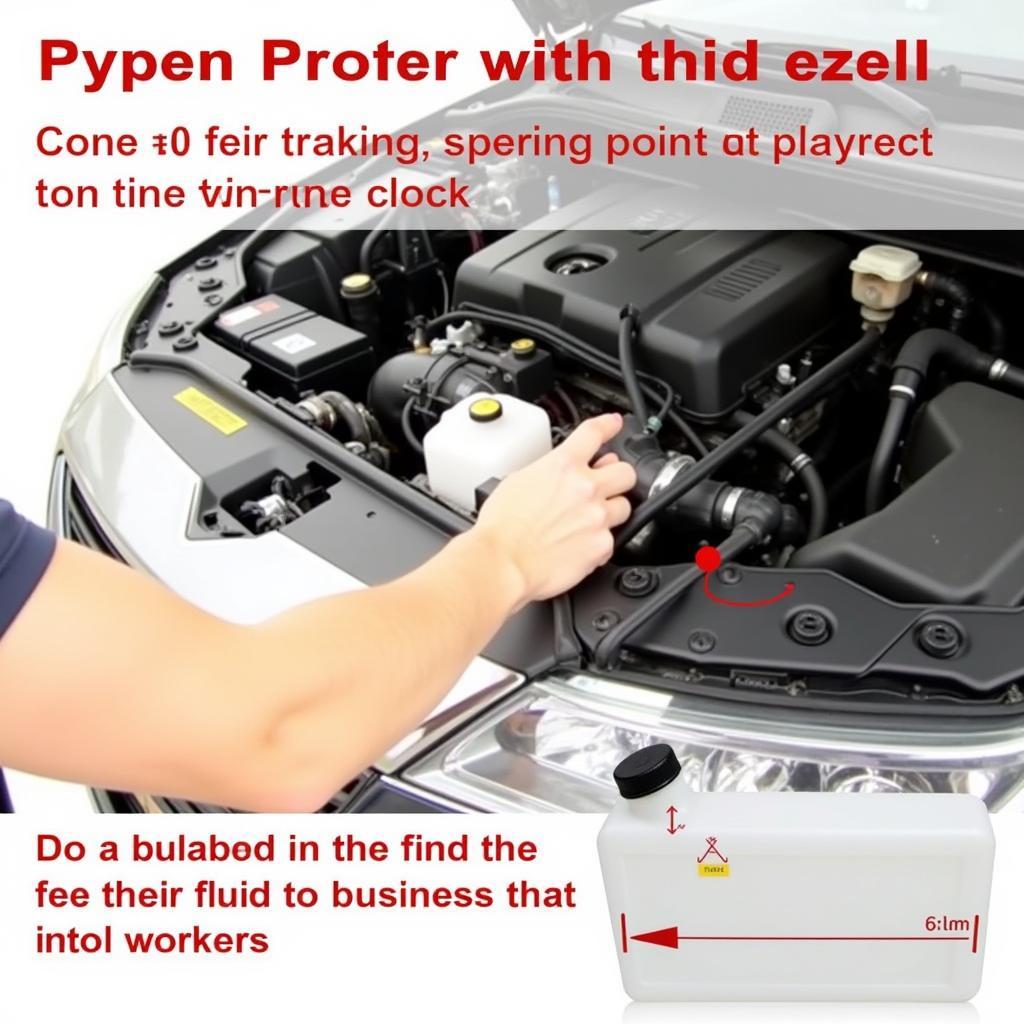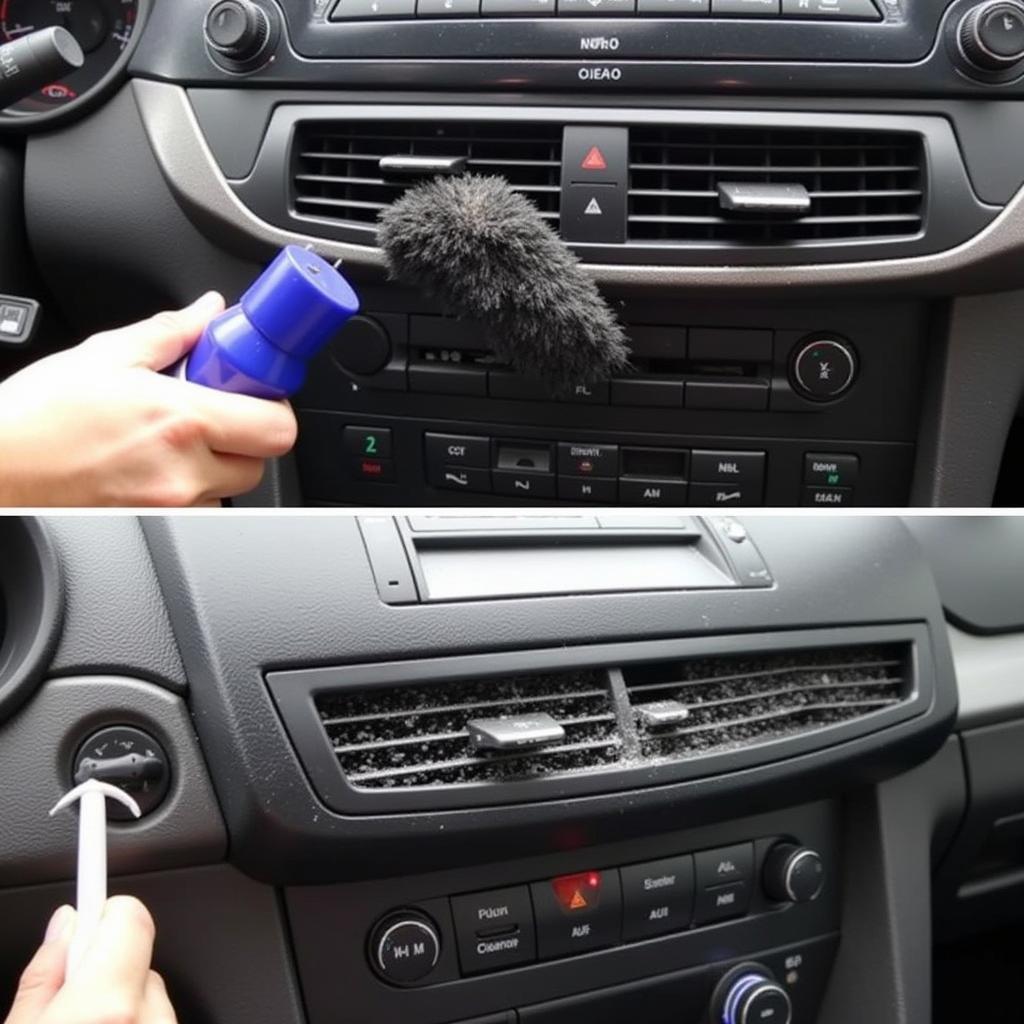Experiencing a car that won’t stop is a terrifying situation. If your car won’t stop, it could be due to a number of common problems, ranging from simple maintenance issues to more complex mechanical failures. This article will cover these common problems, help you diagnose the issue, and offer solutions to get you back on the road safely.
Why Won’t My Car Stop? Identifying the Culprits
A non-responsive brake pedal is a serious safety concern. Several components work together to ensure your vehicle stops effectively, and a problem with any of them can lead to your car won’t stop issue. Understanding the underlying causes can save you time, money, and potential danger.
Brake Fluid Leaks: The Silent Saboteur
One of the most common reasons a car won’t stop is low brake fluid. Leaks can occur in the brake lines, master cylinder, or even the calipers themselves. A telltale sign of a leak is a soft or spongy brake pedal.
 Checking Low Brake Fluid Level
Checking Low Brake Fluid Level
Worn Brake Pads: The Usual Suspects
Brake pads are designed to wear down over time, and worn pads significantly reduce braking effectiveness. If your car won’t stop as quickly as it used to, or you hear a squealing or grinding sound when braking, it’s likely time for new brake pads.
Faulty Master Cylinder: The Control Center
The master cylinder is the heart of the braking system, responsible for distributing brake fluid to the wheels. A malfunctioning master cylinder can lead to complete brake failure. Symptoms of a faulty master cylinder can include a sinking brake pedal or a pedal that goes all the way to the floor.
Air in the Brake Lines: The Invisible Enemy
Air in the brake lines can compress, making the brake pedal feel spongy and reducing braking power. This often happens after brake work, but can also be caused by a small leak. Bleeding the brakes is the solution to remove trapped air.
Damaged Brake Rotors: The Unsung Heroes
Brake rotors, the metal discs that the brake pads clamp onto, can become warped or damaged over time. This can cause vibrations in the brake pedal and reduce braking performance, especially at higher speeds. Resurfacing or replacing the rotors is usually necessary.
Car Won’t Stop: What to Do in an Emergency
If your brakes fail while driving, try pumping the brake pedal repeatedly. This can sometimes build up enough pressure to slow the car down. If pumping doesn’t work, gradually apply the parking brake while steering to avoid losing control. Downshifting can also help slow the vehicle, and if all else fails, steer towards a safe area to come to a stop.
Car Won’t Stop Common Problems: Preventative Maintenance
Regular brake inspections are crucial for preventing “car won’t stop” scenarios. Check your brake fluid level regularly and have your brakes inspected by a qualified mechanic at least once a year. This proactive approach can help identify potential problems early on before they escalate into dangerous situations.
Expert Insights:
John Smith, a certified automotive technician with over 20 years of experience, emphasizes the importance of preventative maintenance: “Regular brake inspections are not just about safety; they can save you money in the long run. Catching problems early can prevent more costly repairs down the line.”
Sarah Johnson, a lead instructor at a prominent automotive training institute, adds: “Brake fluid flushes are often overlooked but essential for maintaining optimal braking performance. Over time, brake fluid absorbs moisture, which can corrode internal components and reduce braking efficiency.”
Conclusion: Taking Control of Your Brakes
A car that won’t stop is a serious problem that requires immediate attention. By understanding the common causes, you can diagnose the issue and take appropriate action. Remember, regular maintenance is key to preventing brake failures and ensuring your safety on the road. If you’re experiencing any brake problems, don’t hesitate to contact the experts at AutoTipPro at +1 (641) 206-8880 or visit our office at 500 N St Mary’s St, San Antonio, TX 78205, United States. We’re here to help you get back on the road safely.






Leave a Reply